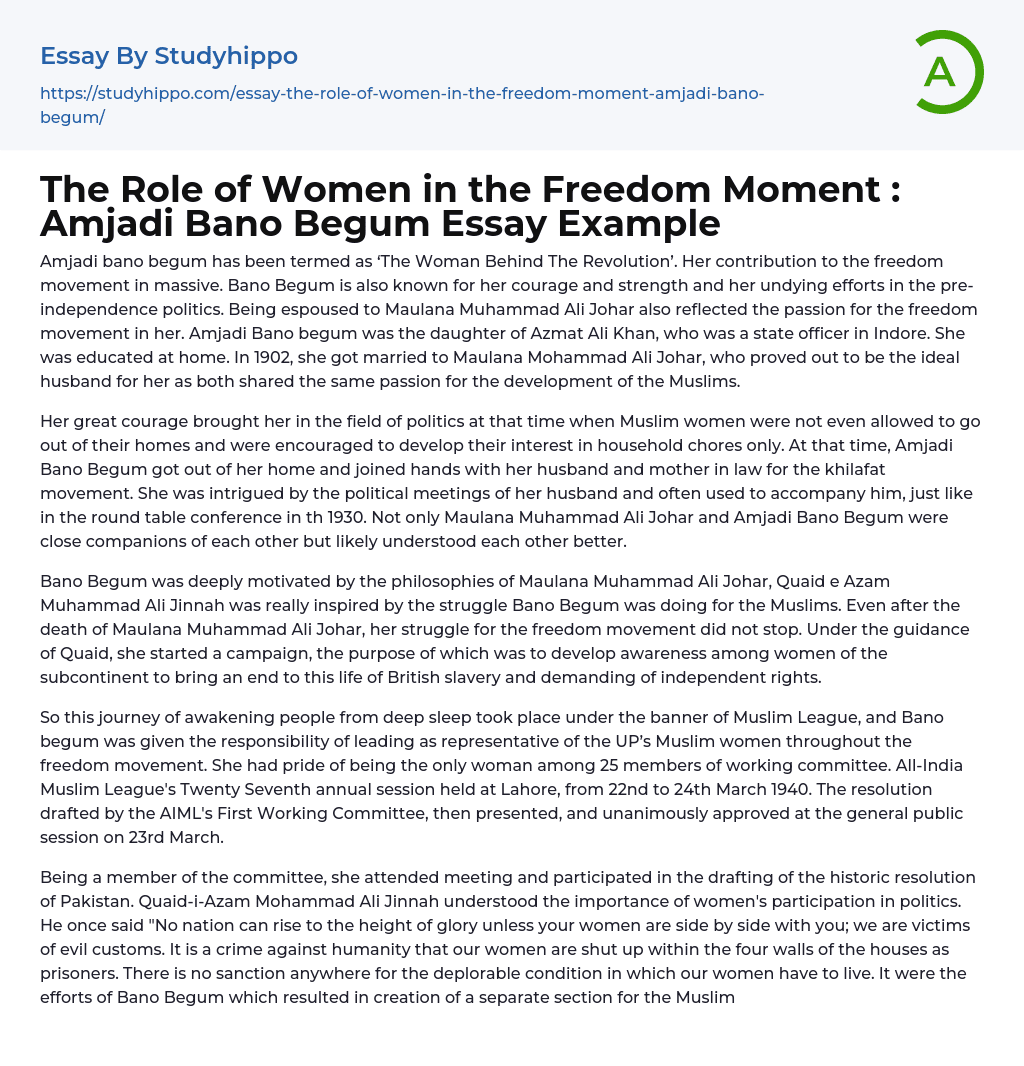

The Role of Women in the Freedom Moment : Amjadi Bano Begum Essay Example
Amjadi Bano begum, who is also referred to as 'The Woman Behind The Revolution', had a significant part in the freedom struggle. Her courage and resolve in the political sphere before independence were notable. She was wedded to Maulana Muhammad Ali Johar, reflecting their mutual enthusiasm for the liberation movement. As Azmat Ali Khan's daughter, a state officer in Indore, Amjadi Bano begum received her education domestically. Their union in 1902 was perfect since they both held strong zeal for the advancement of the Muslim community.
Despite the societal restrictions on Muslim women during that time, Amjadi Bano Begum showed great courage by venturing into the field of politics. While most women were confined to their homes and encouraged to focus on domestic duties, Amjadi Bano Begum joined her husband and mother-in-law in the khilafat movement.
...She actively participated in political meetings alongside her husband, even attending the round table conference in 1930. It is evident that Maulana Muhammad Ali Johar and Amjadi Bano Begum not only shared a close companionship but also had a deep understanding of each other.
Bano Begum was greatly influenced by the philosophies of Maulana Muhammad Ali Johar. Quaid e Azam Muhammad Ali Jinnah found inspiration in Bano Begum's efforts for the Muslim community. Despite the passing of Maulana Muhammad Ali Johar, she continued her fight for the freedom movement. With the guidance of Quaid, she initiated a campaign aimed at empowering women in the subcontinent and ending British oppression, demanding independence for their rights.
Under the banner of the Muslim League, Bano Begum led the journey of awakening people from deep sleep. She represented
UP's Muslim women throughout the freedom movement and was proud to be the only woman among 25 members of the working committee. The resolution, which was drafted by the AIML's First Working Committee, was presented and unanimously approved at the general public session during the Twenty Seventh annual session of the All-India Muslim League held in Lahore from 22nd to 24th March 1940 on 23rd March.
As a committee member, she was actively involved in the meetings and contributed to the drafting of Pakistan's landmark resolution. Quaid-i-Azam Mohammad Ali Jinnah highlighted the pivotal role women play in politics. He once articulated, "A nation cannot attain greatness without women standing alongside men; we endure detrimental traditions. The confinement of our women within four walls akin to prisoners is an offense against humanity. Our women's lamentable living conditions have no justification." It was through Bano Begum's initiative that a distinct division for Muslim women was established under the All-India Muslim League. Following Maulana Mohammad Ali's demise, Turkish woman Halide Edib visited India and recognized Bano Begum as profoundly influential. Edib noted, "Begum Mohammad Ali acted as a go-between for me and the purdah club. She remained faithful to her husband's instructions and demonstrated firm character traits. In my eyes, she mirrored those Turkish women from twenty-eight years prior who devoted themselves to their country’s service, especially concerning social issues."
She is resolved to progress at her own pace and will not be hurried. If Muslim women aspire for transformation, it should be achieved without abandoning Purdah. She personally engaged with men while maintaining her veil, paralleling the conduct of middle-class Turkish women in 1908. At
the Jamia lecture hall, there were two categories of female attendees: some who shared a side with men and others who positioned themselves behind a curtain. She chose to sit by herself on a platform at the back. Her stance does not align with those who have broken through barriers nor with those contented with their current state.
Her seat at the lectures was indicative of her attitude, inspiring other Muslim women like Noor-us-Sabah Begum from the Sherpur family. Noor-us-Sabah Begum, supported by her husband, joined the Khilafat Movement and transformed her lifestyle after being inspired by the personality of Amjadi Bano Begum. The motivation of Amjadi Begum empowered Noor-us-Sabah Begum to spread the message of the freedom movement.
- Quran essays
- Al-Qaeda essays
- Muhammad essays
- Muslim essays
- Ali essays
- Ramadan essays
- Activity essays
- Believe essays
- Comfort Zone essays
- Dance essays
- Fashion essays
- Fishing essays
- Fitness essays
- Freedom essays
- Habits essays
- Healthy Lifestyle essays
- Hobby essays
- Hunting essays
- Interests essays
- Justification essays
- Moment essays
- Optimism essays
- Peace essays
- Perfume essays
- Shoes essays
- Shopping essays
- Silence essays
- Superstition essays
- Survival essays
- Vegetarianism essays
- Welfare essays
- Worldview essays
- Afterlife essays
- Atheism essays
- Bible essays
- Buddhism essays
- Christian Worldview essays
- Christianity essays
- Confession essays
- Cosmological Argument essays
- Deism essays
- Devil essays
- Existence of God essays
- Faith essays
- Freedom Of Religion essays
- God essays
- Hinduism essays
- Immortality essays
- Islam essays
- Jainism essays



